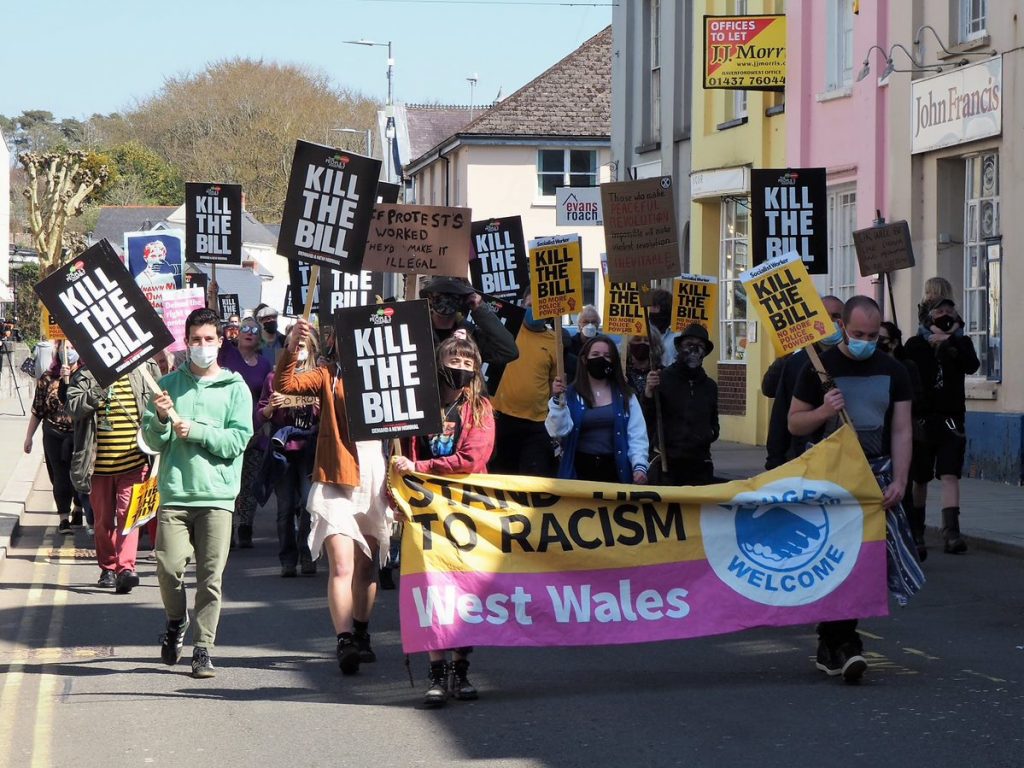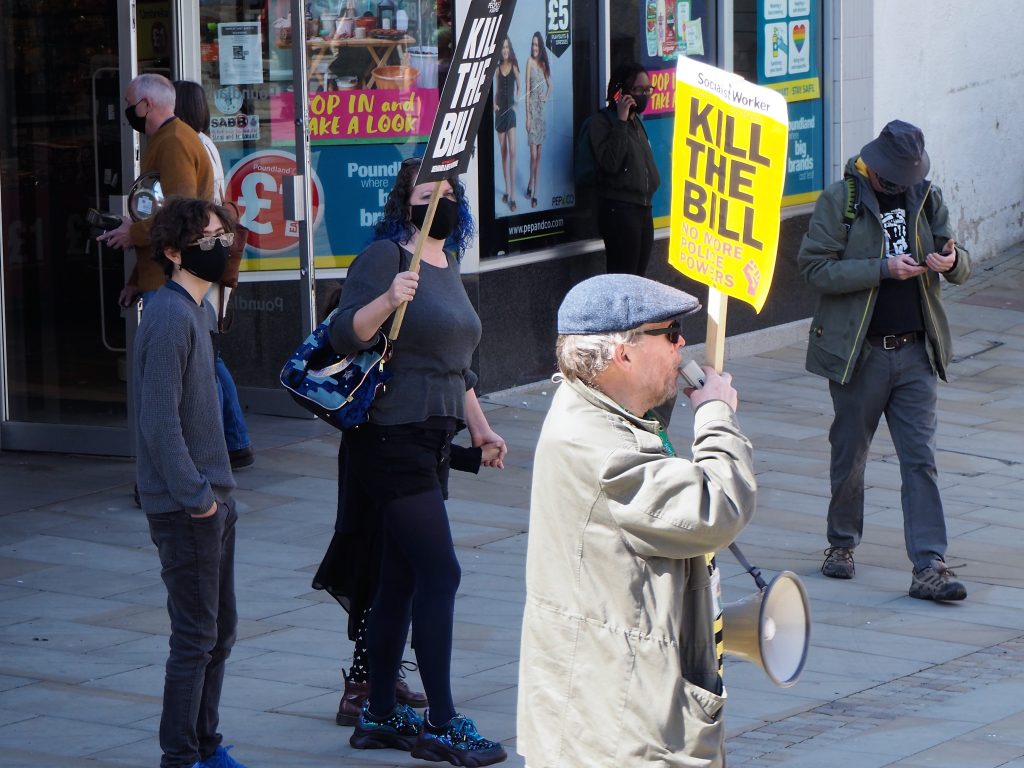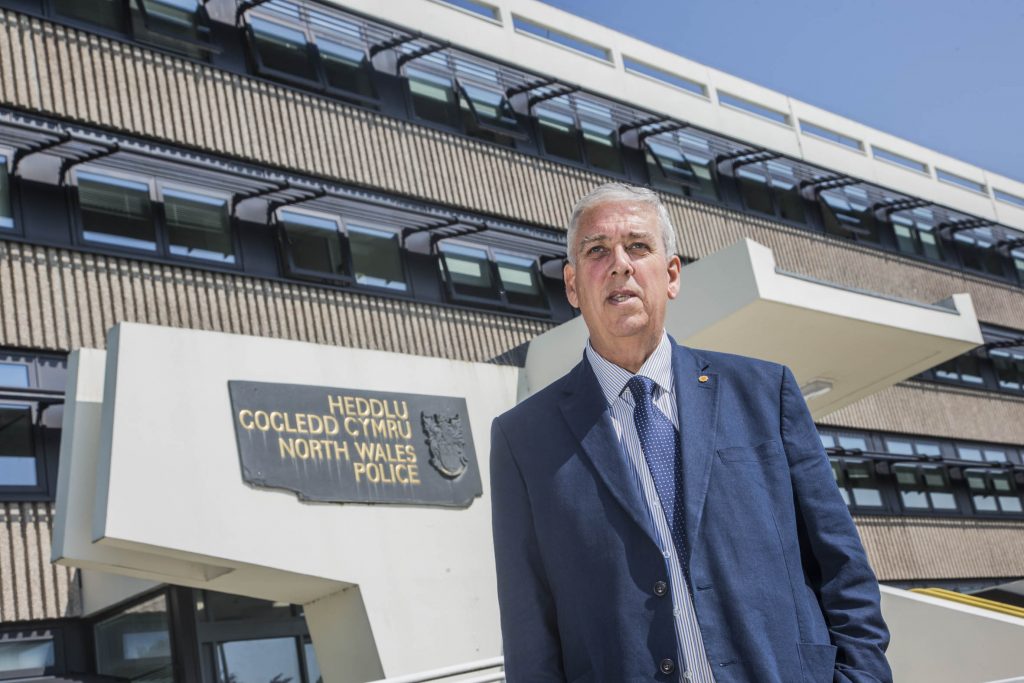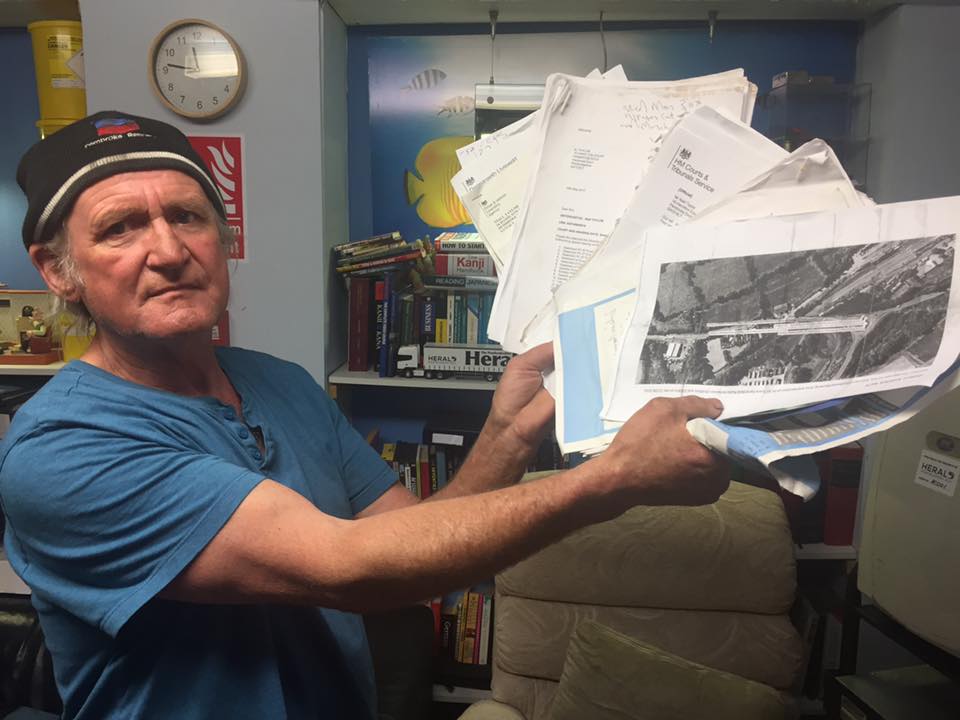News
Protest against ‘draconian’ Police and Crime Bill takes place in Haverfordwest

A SECOND Kill the Bill protest took place in Haverfordwest on Saturday (Apr 17).
One of the organisers told The Herald: “The new law will be an enormous piece of draconian legislation that includes significant expansion in police powers to curtail the right to protest. The right to peacefully assemble and protest are a fundamental part of any democracy; empowering people to have their voices heard, in addition to holding the Government to account. These rights are universal –they protect peaceful and legitimate protest whatever the cause.“The events at the Clapham vigil and at demonstrations over the last few weeks are a dangerous indication of what the future of protest will look like if the police powers bill gets through parliament.”
A local campaigner, a mother and grandmother said “We are in the process of losing a fundamental part of our democracy, It is important we protect it for future generations. We have messed up so much of their future already-we need to hold the Government to account”.
Aspects of the Bill include:
- The power for Police forces to shut down protests that they deem too disruptive at their own discretion.
- Up to a 10-year sentence for demonstrators considered to be causing a “public nuisance”.
- The power for police forces to impose start and end times on static protests of any size.
- The power to expand stop and search powers, which already discriminate against marginalised communities. If you live in the Dyfed Powys police area, you are 5 times more likely to be stopped and searched if you are black than white.
- Up to 10-year sentences for damage to public monuments’ Police powers will be expanded and custodial sentences increased to “protect” women.
- These measures are not sufficient to prevent violence and are troubling, considering some police officers’ involvement in cases of violence against women. Significant restrictions on where protests around Parliament may take place.
- The elevation of trespass from a civil offence to a criminal offence, meaning police and courts can give harsh sentences to Travellers.
- Increased power of police to seize vehicles and homes from Gypsy, Roma, and Traveller communities and demanding proof of permission to travel.
- The bill will criminalise a way of life for these communities.
Some of the proposals in the new bill which is the subject of the protest include putting start and finish times on protests, as well as noise limits. The bill also says damage to memorials could lead to up to 10 years in prison. The bill could also expand stop-and-search powers and includes an offence of “intentionally or recklessly causing public nuisance,” which is designed to stop people occupying public spaces and doing things like hanging off bridges or gluing themselves to windows.

The bill will be reintroduced to Parliament after the Queen’s Speech, according to the Home Office, with Commons Committee Stage expected to be completed by 24 June.
“The Police, Crime, Sentencing and Courts Bill delivers on the government’s commitment to crack down on crime and build safer communities,” a Home Office spokesperson says. “We are equipping the police with the tools they need to stop violent criminals in their tracks.” They add that the bill “enshrines our commitment to those brave officers who put themselves in danger to keep rest of us safe into law”.
One protestor told Herald.Wales: “People are getting more angry and more frustrated and they feel like their issues are not being dealt with – but are rather just simply being cracked down on.
“And that is the wrong approach. People are still going to take to the streets and be even more passionate.”

Protests – a senior police officer’s view
A police boss who describes himself as an “experienced protester” says a report on how protests are policed is one sided, illiberal and undermines civil and political rights.
North Wales Police and Crime Commissioner Arfon Jones is so concerned that he has written to Home Secretary Priti Patel to complain about it.
The UK Government used the report by Her Majesty’s Inspectorate of Constabulary, Fire and Rescue Service (HMICFRS),“Getting the balance right?, when they were drafting the controversial Police, Crime, Sentencing and Courts Bill.

According to the inspectors, the balance had tipped too heavily in favour of protesters.
The legislation will give the police powers to set start and end times for static protests and stop protests if they are judged to be too noisy or too “disruptive”.
Protesters face fines of up to £2,500 and up to 10 years in jail if they are convicted.
Mr Jones, a former police inspector, said: “Although equilibrium should be struck between individual rights to protest and the general interests of the community, I simply do not agree the balance tips too readily in favour of protestors.
“The recommendations in the report are one sided, illiberal and undermine civil and political rights and are not in the public interest.
“The new powers in the proposed act are not necessary and will prevent protest as we know today. The whole purpose of protest is to disrupt and to seek change.
“The police have enough powers to police protests and do not need more. I do not believe that HMICFRS have the balance right in this report and as an *experienced* protestor for the last 50 years the perception that police are favourable towards protestors rights is a fallacy.
“Policing protests has always been, and always will be, a tool of the state to control its citizens and I will have no truck with it.
“Automatic Facial Recognition in non-violent protests is a privacy intrusion and should not be used.
“Non-violent protests should be policed as events not as a public order exercise.
“The Police, Crime, Sentencing and Courts Bill will afford new powers to officers to tackle protests, including measures aimed at static protests and a new offence of ‘intentionally or recklessly causing public nuisance’, which is in part defined as causing ‘serious annoyance’ or ‘serious inconvenience’.
“In a democracy the right to protest sometimes means people are inconvenienced, such is the price of living in a society where voicing support for a cause of your choosing is permitted. “These proposals seek to whittle that right down to such a degree that any demonstration, large or small, may be heavily restricted or even curtailed altogether. The effect on free expression will be substantial.
“The report is short-term and politically driven. Policing should be very careful not to be drawn into the situation of being arbiters of which protests can go ahead and become stuck in the middle.
“The policing of industrial action in the 1970s reminds us that policing protests may cause long-term damage on the relationships between community and police.
“The United Kingdom and its people have been through a very difficult year, with exceptional Covid-19 restrictions coming to an end as the pandemic recedes.
“This is a time for reflection and consideration, not a time to be rushing through poorly thought out measures to impose disproportionate controls on free expression.
“Such laws may shield ministers and corporations from public dissent, but who would wish to live in a society where such matters are guiding principles of legislation?”
Entertainment
One Night in Dublin returns to the Torch with a brand-new show

ONE NIGHT IN DUBLIN is heading back to the stage at the Torch Theatre with a lively new production fronted by renowned Irish singer Danny Muldoon.
Tickets are already selling fast for the feel-good celebration of Irish music, which promises two hours of songs, stories and plenty of craic.
Backed by an award-winning five-piece band, Muldoon leads audiences through a packed set of sing-along favourites including Galway Girl, Tell Me Ma, The Irish Rover, Dirty Old Town, Whiskey in the Jar, The Wild Rover and The Galway Shawl, along with many more well-loved classics.
The show recreates the atmosphere of a bustling Dublin pub, complete with fiddle, whistle, guitars, banjo, bodhrán, accordion and driving drums, transporting the audience straight into “Murphy’s Tavern” for an unforgettable night of live entertainment.
Fans can also expect hits from Irish legends including The Pogues, The Saw Doctors, The Dubliners, The Fureys, Flogging Molly and Dropkick Murphys.
One Night in Dublin comes to the Torch Theatre on Thursday, March 26 at 7:30pm.
Tickets cost £26.50. Visit the theatre website or call the Box Office on (01646) 695267 to book.

Crime
Hakin man’s appeal delayed again as Crown Court seeks guidance on insurance law

Judge gives CPS more time to review latest road traffic law guidance before case returns in March
A HAKIN man’s appeal against a conviction for driving without insurance has been delayed after a judge granted prosecutors additional time to review updated legal guidance.
Seventy-six-year-old Niall Taylor, of Haven Drive, appeared at Swansea Crown Court on Tuesday (Jan 13) for a mention hearing in his case.
Taylor has accepted the finding that he drove otherwise than in accordance with a licence, but is challenging the separate conviction for using a vehicle without insurance.
The case relates to an incident on January 18, 2023, when he drove a Vauxhall Zafira along Hammond Avenue, Haverfordwest.
The matter has already followed an unusual procedural history. Taylor initially pleaded not guilty in the magistrates’ court but later changed his plea during the original trial. Questions were subsequently raised over whether that plea had been “equivocal”, leading the case to be reopened under Section 142 of the Magistrates’ Courts Act 1980 and reheard in full.
Following a trial of the facts, magistrates found him guilty and imposed sentence in December. Taylor has since lodged an appeal focused solely on the insurance offence.
During Tuesday’s hearing, His Honour Judge Walters granted the Crown Prosecution Service 28 days to review Wilkinson’s Road Traffic Offences (32nd Edition), the leading legal reference text used by courts in motoring cases.
Addressing the court, the judge said the matter may still require further consideration, adding: “The court still might want to reconsider the sentence even if the insurance company is right. It does look as if different insurance companies do things in different ways.”
He added: “It is not in fact void, but it is voidable.”
Taylor maintains that a valid insurance policy was in force at the time of driving and argues that, in law, third-party cover cannot simply be cancelled because of an administrative licensing issue.
The appeal is due to return to Swansea Crown Court on March 27, when further legal argument is expected.
Business
Pub rate relief welcomed but closures still feared

CAMRA warns one-year discount is only a sticking plaster as many Welsh locals face rising bills
A BUSINESS rates discount for Welsh pubs has been welcomed as a step in the right direction — but campaigners warn it will not be enough to stop more locals from shutting their doors.
The Campaign for Real Ale (CAMRA) says the Welsh Government’s decision to offer a 15 per cent reduction on business rates bills for the coming year will provide short-term breathing space for struggling publicans.
However, it believes the move fails to tackle deeper problems in the rating system that continue to pile pressure on community pubs across Wales, including in Pembrokeshire and Carmarthenshire.
Chris Charters, Director of CAMRA Wales, said: “Today’s announcement from the Finance Secretary that pubs will get 15% discount on their business rates bills is a welcome step.
“However, many pubs still face big hikes in their bills due to the rates revaluation which could still lead to more of our locals in Wales being forced to close for good.
“15% off for a year is only the start of supporting pubs with business rates. It won’t fix the unfair business rates system our pubs are being crushed by.”
He added: “Welsh publicans need a permanent solution, or doors will continue to close and communities will be shut away from these essential social hubs that help tackle loneliness and isolation.”
Mounting pressure on locals
Under plans announced by the Welsh Government, pubs will receive a temporary discount on their rates bills for the next financial year.
But CAMRA argues that many premises are simultaneously facing sharp increases following the latest revaluation, which recalculates rateable values based on property size and trading potential.
For some smaller, rural venues, especially those already operating on tight margins, the increases could wipe out the benefit of the relief entirely.
Publicans say they are also contending with rising energy costs, higher wages, supplier price hikes and changing customer habits since the pandemic.
In west Wales, several long-standing village pubs have either reduced their opening hours or put their businesses on the market in the past year, with landlords warning that overheads are becoming unsustainable.
Community role
Campaigners stress that the issue goes beyond beer sales.
Pubs are often described as the last remaining social spaces in small communities — hosting charity events, sports teams, live music and local groups.
In parts of rural Pembrokeshire, a pub can be the only public meeting place left after the loss of shops, banks and post offices.
CAMRA says supermarkets and online retailers enjoy structural advantages that traditional pubs cannot match, making it harder for locals to compete on price.
The organisation is now calling on ministers to introduce a permanently lower business rates multiplier for pubs, rather than relying on short-term discounts.
Long-term reform call
CAMRA wants whoever forms the next Welsh administration to commit to fundamental reform of the rating system, arguing that pubs should be recognised as community assets rather than treated like large commercial premises.
Without change, it warns, the number of closures is likely to accelerate.
Charters said: “This is about protecting the future of our locals. Once a pub shuts, it rarely reopens. We can’t afford to lose any more.”
For many communities across west Wales, the fear is simple: temporary relief may buy time — but it may not be enough to save the local.
-

 Health5 days ago
Health5 days agoConsultation reveals lack of public trust in health board
-

 News6 days ago
News6 days agoCaldey still unsafe, survivors warn — despite Abbey’s reform claims
-

 Community6 days ago
Community6 days agoPembrokeshire students speak at national Holocaust Memorial Day event
-

 News6 hours ago
News6 hours agoPrincess of Wales visits historic Pembrokeshire woollen mill
-

 News6 days ago
News6 days agoKurtz raises Gumfreston flooding in the Senedd as petition deadline nears
-

 Crime4 days ago
Crime4 days agoPembroke man accused of child sex offences sent to Swansea Crown Court
-

 Education6 days ago
Education6 days ago‘Vulnerable teen’ questioned by police at Milford Haven School
-

 Community5 days ago
Community5 days agoCampaign to ‘save’ River Cleddau hits over 2,200 signatures







































